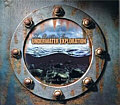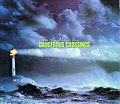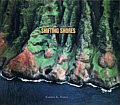The Restless Sea
A series for kids
Carole G. Vogel
Franklin Watts, $12.95ea/pb
It is the extraordinary book that becomes more urgently relevant over time. Award-winning children's author, Carole G. Vogel has written six such books. Each one deals with a discreet and specific aspect of one of the most significant elements of our ocean planet: the ocean.
Published in 2003 for middle-schoolers, the series was promptly neglected by the publisher because of an unfortunate marketing decision. But the publisher did us all a disservice. These books are so well written, designed and illustrated (with spectacular full-page color photographs) that they deserve the attention of every reader-regardless of the age - who is curious about the intricate transactions between the oceans of air and oceans of water which form the life support systems of our world.
Each of the six books in the series presents a stand alone discussion of a particular aspect of ocean science from geologic formation to sources of salinity, the influence of the sun and moon to survival techniques of its amazing and exotic denizens, both plant and animal.
  Ocean Wildlife (88pp) as the title states focuses on the fauna and food chains that only exist in the salt water environment. Survival techniques, exotic sensory mechanisms, location devices, tides and tidal zones are some of the subjects that Vogel explains with an easy clarity and a minimum of technical vocabulary. The accompanying photographs which alternate with pages of text are dazzling. Ocean Wildlife (88pp) as the title states focuses on the fauna and food chains that only exist in the salt water environment. Survival techniques, exotic sensory mechanisms, location devices, tides and tidal zones are some of the subjects that Vogel explains with an easy clarity and a minimum of technical vocabulary. The accompanying photographs which alternate with pages of text are dazzling.
  Underwater Exploration (72pp) examines mankind's efforts to understand and exploit the seas and the ocean basin. Discoveries of many a treasure ship are part of the bargain. Tracing the progress of ocean exploration from the building and deployment of the first bathyscaphe, Trieste in 1953 to modern sonar mapping, Vogel touches on such fascinating subjects as continental drift, the chemicals of life and underwater volcanoes and deep sea vents that can now be observed, measured and analyzed by un-manned deep sea submersibles bristling with sensors. Underwater Exploration (72pp) examines mankind's efforts to understand and exploit the seas and the ocean basin. Discoveries of many a treasure ship are part of the bargain. Tracing the progress of ocean exploration from the building and deployment of the first bathyscaphe, Trieste in 1953 to modern sonar mapping, Vogel touches on such fascinating subjects as continental drift, the chemicals of life and underwater volcanoes and deep sea vents that can now be observed, measured and analyzed by un-manned deep sea submersibles bristling with sensors.
  Dangerous Crossings (72pp) is a rollicking good read about all sorts of disasters which happen to involve the ocean. Killer hurricanes, tidal waves and typhoons which cause ship sinkings and survival stories are only bested by the exploits of pirates then and now. (Perhaps the most remarkable story in this volume is that of the Vietnamese boat people-almost half the Vietnamese boats that made it to sanctuary had been attacked by pirates.) Dangerous Crossings (72pp) is a rollicking good read about all sorts of disasters which happen to involve the ocean. Killer hurricanes, tidal waves and typhoons which cause ship sinkings and survival stories are only bested by the exploits of pirates then and now. (Perhaps the most remarkable story in this volume is that of the Vietnamese boat people-almost half the Vietnamese boats that made it to sanctuary had been attacked by pirates.)
  Savage Waters (73pp) presents an outstanding explanation of the "rhythms of the sea," that is, tides, currents, wave construction, sea level, drifts, streams and gyres, the sea floor and heavenly bodies which influence them...and the climates they help to create. Beside the usual surfeit of knock-out photographs, the text of his book is augmented with beautifully rendered illustrations of the various phenomena under discussion. I never quite understood how waves formed and moved until I read this explanation and absorbed the accompanying illustrations. Savage Waters (73pp) presents an outstanding explanation of the "rhythms of the sea," that is, tides, currents, wave construction, sea level, drifts, streams and gyres, the sea floor and heavenly bodies which influence them...and the climates they help to create. Beside the usual surfeit of knock-out photographs, the text of his book is augmented with beautifully rendered illustrations of the various phenomena under discussion. I never quite understood how waves formed and moved until I read this explanation and absorbed the accompanying illustrations.
  In Shifting Shores (70pp) Vogel discusses the various ways in which the
contours of continents change. The shifting of tectonic plates, volcanoes
and seamounts, tsunamis meteorites, sinking shores and rising oceans are
constantly reshaping the land masses. Human activity also influences the
health and condition of the dry ground which we inhabit. In Shifting Shores (70pp) Vogel discusses the various ways in which the
contours of continents change. The shifting of tectonic plates, volcanoes
and seamounts, tsunamis meteorites, sinking shores and rising oceans are
constantly reshaping the land masses. Human activity also influences the
health and condition of the dry ground which we inhabit.
The author neatly exemplifies the consequences of these natural processes
and human decisions using examples of two cities - ancient Heraklieon, lying
26 feet under water in the Mediterranean Sea, about 4 miles off the north
coast of Egypt, and modern New Orleans, Louisiana today 6 ½ feet below sea
level-and sinking.
Scientists theorize that Herakleion was drowned during the eighth century
A.D. either by an earthquake or by the flooding of the Nile River which
turned the marshy delta land on which the city stood into ooze which simply
sank under the excess weight of water.
Vogel draws a
parallel between Heraklieon and New Orleans which is built on the
Mississippi River's marshy delta ooze, so clearly vulnerable not so much to
earthquakes as floods produced by violent weather. Herakleion thrived for
more than a thousand years before succumbing to the sea. Does New Orleans
even have half a chance for such longevity?
  Each volume in The Restless Sea series stands on its own merit but Human Impact (87pp) is also a coda to the rest of the books in the series. Vogel says it may be the most important book she has ever written. With emphasis on the connectivity of all the ecosystems that exist on the planet, she cites the havoc and disruption that human activity has had on the survivability of the very systems we depend on for our own existence. Overpopulation, overdevelopment of the coastal fringe, over fishing, over fertilizing. Combined with the practice of dumping and draining, ignoring toxic run-off our cavalier (at best) behavior has caused "dead zones" which are growing in size and number. Just think about it. Each volume in The Restless Sea series stands on its own merit but Human Impact (87pp) is also a coda to the rest of the books in the series. Vogel says it may be the most important book she has ever written. With emphasis on the connectivity of all the ecosystems that exist on the planet, she cites the havoc and disruption that human activity has had on the survivability of the very systems we depend on for our own existence. Overpopulation, overdevelopment of the coastal fringe, over fishing, over fertilizing. Combined with the practice of dumping and draining, ignoring toxic run-off our cavalier (at best) behavior has caused "dead zones" which are growing in size and number. Just think about it.
Both instructive and thoroughly enjoyable, these books are written in clear, economical prose that is easily digestible to both youngsters and adults. They should not only be in every school and public library, but on your own bookshelf (or coffee table, they are that handsome). Dangerous Crossings, Savage Waters, Underwater Exploration and Ocean Wildlife are in stock at Amazon. Human Impact and Shifting Shores seem to be available in paperback only from the secondary marketplace...or harass your nearest book dealer. There are hardcover editions available for each title. Urge your local library to buy the series.
|